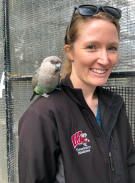
Former Resident Wins National Honor Society Research Award
Dr. Mary Thurber, DVM, DACZM, a former UC Davis School of Veterinary Medicine resident in zoological medicine, was named a recipient of the 2020 Society of Phi Zeta Research Manuscript Award. Phi Zeta, the international honor society of veterinary medicine, annually recognizes two research awards in the Basic Science category and the Clinical Science category.

Dr. Thurber’s award for Clinical Science was a result of research conducted during her residency at UC Davis from 2015-2018. Her paper titled "Reference Intervals for Acute Phase Proteins for Koalas (Phascolarctos cinereus) at the San Diego Zoo" was published in the Journal of Zoo and Wildlife Medicine. Dr. Thurber’s manuscript was sponsored by the Lambda chapter of Phi Zeta at UC Davis.
“I am honored to have received this prestigious award for research conducted during my residency in zoological medicine through UC Davis and San Diego Zoo Global,” said Dr. Thurber. “Our research study on acute phase proteins in koalas is just one example of the unique opportunities in clinical medicine and research fostered by this collaborative residency program. This research award is also a credit to the incredible mentors from UC Davis and San Diego Zoo Global, who encourage and support their trainees to promote research in conservation and to advance the field of zoological medicine.”
The three-year zoological medicine residency at UC Davis is a multi-location advanced training program consisting practicing veterinary medicine for a year at the Sacramento Zoo, a year at the San Diego Zoo, and a final year at San Diego Zoo Safari Park and SeaWorld San Diego.
Dr. Thurber is a 2014 graduate of the University of Wisconsin School of Veterinary Medicine. Following her residency at UC Davis, she served as a staff veterinarian at the Oakland Zoo. She has been a clinical instructor of zoological medicine at the University of Wisconsin since July 2019.
The Society of Phi Zeta was originated in 1925 by a group of senior veterinary students at the New York State Veterinary College at Cornell University. It became a national organization in 1929 and currently has thirty-two chapters nationwide. The society’s objectives are to recognize and promote scholarship and research in matters pertaining to the welfare and diseases of animals.
# # #
